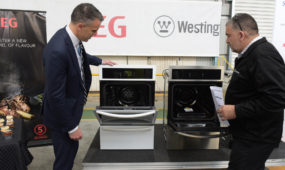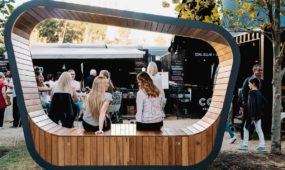Can Australia still make cars? An interview with Ethan Automotive
Manufacturing
It’s a brave set of people who decide to take on the challenge of keeping car making alive in this country. Ethan Automotive’s plans aren’t detailed at the moment, but they believe, with a little help, they’re up to the task. Brent Balinski spoke to the company’s chief executive, Brigid Mahoney.

Sign up to receive notifications about new stories in this category.
Thank you for subscribing to story notifications.
“The End Of The Road”
Two thousand and seventeen is “The End Of The Road” for passenger car making in Australia, as headline writer after headline writer reminded us last year.
Start-up Ethan Automotive begs to differ. Its big idea is to think small, at least in terms of production volumes.
Ethan grabbed attention in February when it appeared interested in taking over Holden’s Elizabeth site, which stands to be decommissioned in 2018.
“Then [we] realised over time that actually the answer to what the problem is, is that the high-volume production just won’t work in a fragmented market like Australia,” Brigid Mahoney, Ethan Automotive’s Chief Executive, told Manufacturers’ Monthly.
According to Ethan, it’s possible for them to be profitable at 10,000 vehicles produced a year. The key is agility.
“We’ll be using an adaptable, modular platform for each vehicle in the initial range, we won’t have to go through that whole tooling process that the bigger carmakers do for each model; essentially just put a new top on and you’ve got a new model,” explained Mahoney.
“And that’s not an unusual thing – Volkswagen do that at the moment. So that’s one thing that helps us keep our costs down and means we’re a bit more agile to market and can change with market conditions more readily. Where someone like Holden at the moment, if their volumes start to drop – because they’re a high-volume production – the line just keeps going and they can’t stop easily.”
Ethan’s schedule involves prototyping in 2017, producing 12,000 vehicles the year after, then building this to 22,000 by 2023.
Details regarding the vehicles to be produced initially – and sold direct to the public – are limited, but the first vehicle is planned as a petrol-powered, rear-wheel-drive, four-cylinder. Hybrid and electric drivetrains are a goal for 2020 and beyond.
The ATS
Ethan is currently seeking special dispensation from industry minister Ian Macfarlane to register for the Automotive Transformation Scheme (ATS), which was back in the news last week when the government announced a backflip on its pre-election promise to cut $500 million from the program.
Under the ATS, an MVP (motor vehicle producer) must produce 30,000 cars a year to register, though may be exempted from this on national interest grounds if the minister sees fit.
Ford, for example, has continued its registration under the scheme this year for national interest reasons.
The ATS has been criticised by some for grant money being tied to the output of the major car makers – zero after 2017 – and not doing enough to help the suppliers innovate, invest and survive.
“We know that the fund as it stands, is not designed in such a way that’s going to give the most to the supply chain or to assist new entrants into the auto sector,” said Mahoney.
“We think that the fund shouldn’t just be used to prop up the industry until the departure of Holden, Ford and Toyota, it should be used in a way that’s consistent with the original intent of the legislation.”
Also worth mentioning is that Mahoney’s group is seeking $600 million from the scheme, which might seem audacious in these straitened times. But – in the bigger scheme of things – Ethan says it’s a reasonable request.
The company points to the Productivity Commission report on assistance to the industry, released last August, which found $30 billion had been spent on the sector between 1997 and 2012.
“So compared to $30 billion, $600 million is a drop in the ocean,” said Mahoney, who says that the company’s plan involves self-sufficiency by 2018.
Outside expertise
Ethan is receiving advice on the way to production from companies including metal pressing specialist Precision Components.
Precision is keenly aware of the challenges to the sector, and recently spoke to Fairfax about the real risk it could fail after Holden – its main customer – ends production.
“We’ll be looking at aluminium panels, so this is something that Precision can’t do at the moment – aluminium hot stamping – and so they’ve done a great job and they’re very experienced and have the willingness to try something new, to broaden the base of what they do.”
Ethan is also receiving advice on car interiors from Futuris.
“But we haven’t signed contracts yet, so we’re still in the pretty early stages of negotiation,” said Mahoney.
As well as this, it’s been reported that among the early financial backers are ex-Holden and Toyota executives.
Mahoney’s firm also added to its capabilities by acquiring West Motorsport Australia earlier this year, a Melrose Park-based, low-volume manufacturer of race cars (pictured at the top of this story).
Ethan Automotive is currently out of Ethan Advisory – a management consultancy division of a group mainly concerned with property – though is currently negotiating sites for a headquarters and a manufacturing facility in South Australia.
An administration, head office and design centre is slated for Port Adelaide, and would employ “70 – 75”. An assembly site for Edinburgh Parks would employ “around 350”.
The goal is to establish a business and hand it over to specialists. Mahoney admitted she was not an expert, though had a pretty good understanding of the challenges the industry faces from roles including as chief of staff to SA’s former manufacturing minister.
“What we’re doing is collecting together the experts in the field who will then take over the helm and run the business – drawing on the expertise of the automotive industry already here,” she said.
“There’s no point reinventing the wheel, as it were, when we’ve got such talent and experience. Not only in Australia, but internationally, who are willing to get involved.”
This article was originally published on Manufacturer’s Monthly.
Story image: Tricia Watkinson/News Corp
Slider image: provided by Ethan Automotive
Jump to next article



